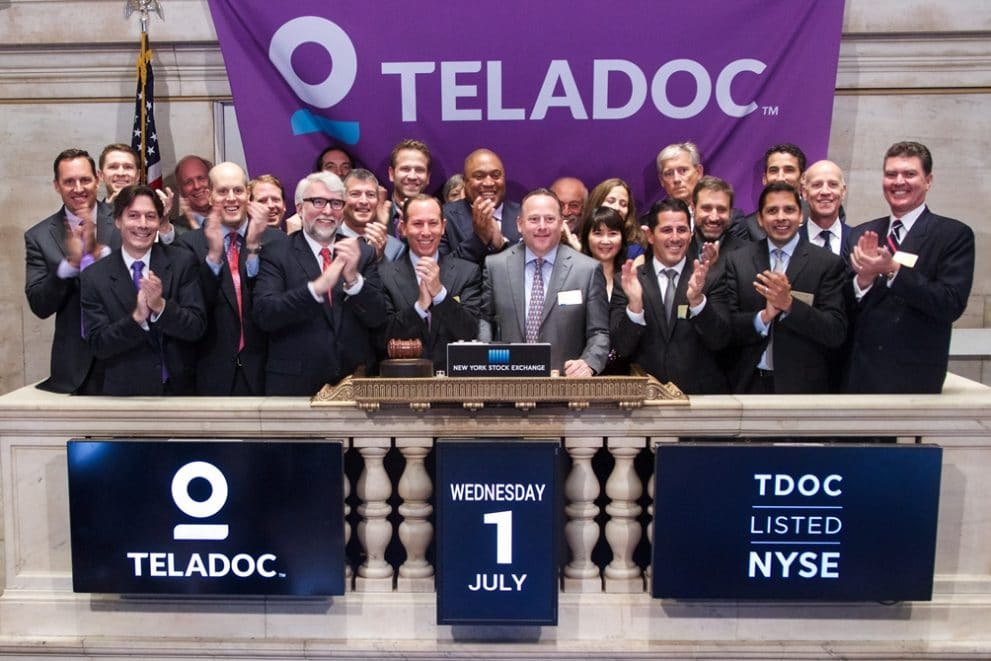
The past year has been pretty grim for shareholders of Teladoc Health (Teladoc Health Stock Quote, Charts, News, Analysts, Financials NYSE:TDOC), a stock which has been on bed rest with a severe case of COVID hangover. But even with the ticket price much cheaper than this time last year, investors searching for bargains in the health tech space would be best served by leaving this under-the-weather name alone, says portfolio manager Paul MacDonald of Harvest Portfolios Group.
Teladoc Health, a telemedicine services and analytics platform, is currently the largest telehealth company in the US with an estimated total US paid membership base of over 52 million. The company shot into the limelight in 2020 with the onset of the COVID-19 pandemic but also through the blockbuster $18.5-billion acquisition of chronic care services company Livongo, making the combined entity a force to be reckoned with in the digital healthcare space.
TDOC’s share price responded accordingly, rising from sub-$100 territory pre-COVID to over $200 per share by the end of 2020 and as high as $293 by mid-February of last year. Since then it’s been a steep dropoff, however, taking the stock all the way back to where it was at the end of 2019 at around $75.
Declining growth rate has been a prime issue for Teladoc, which was admittedly hard-pressed to repeat in 2021 the growth spurt it had in 2020 when use of telemedicine was essentially the only option during multiple lockdowns. By the numbers, Teladoc saw revenue double in 2020 over 2019, going from $553 million to $1.094 billion, with US paid memberships rising 41 per cent in 2020 over 2019 and total patient visits rise a huge 156 per cent.
And while Teladoc’s 2021 has delivered fine on the revenue side, with the first nine months of the year registering even more than a double over the prior year at $1.478 billion versus $710 million, it’s the dwindling growth in subscriptions that’s telling: over the third quarter 2021, for example, Teladoc saw US paid memberships grow by only two per cent, from 51.5 million to 52.5 million. Needless to say, investors will be honing in on that number in the upcoming fourth quarter 2021 report, scheduled for release on February 22.
But for MacDonald, perhaps bigger than the challenge of being a growth company in a time where markets are turning away from growth stocks is the looming threat that much larger healthcare companies in the US will ultimately shift in earnest into the telemedicine space and take up all the oxygen in the room.
“We’ve never owned Teladoc,” said MacDonald, chief investment officer at Harvest Portfolios, speaking on BNN Bloomberg on Thursday. “The valuation was outside of what would fit within our mandates. We see it as one of these companies that has been really impacted by that very high growth shift into other areas in the marketplace.”
“I would also suggest when I think about telemedicine and the integrated network that is required for that, I look at a company like UnitedHealth, which is one of the most vertically integrated health insurers/managed care organizations. If I think about competitive threats, I have to think given their vast amounts of data that they already have from their vast amounts of clients and people that they’re insuring that the barriers to entry into [telemedicine] for United Health would be relatively limited,” he said.
“So, we’re not going to own [Teladoc]. I wouldn’t say sell it after a pullback but be cognizant that you you do have some potentially easy competitive threats to come into that business,” MacDonald said.
MacDonald said for investors to have missed Teladoc’s rise and fall is probably a good thing in the end.
“One of the things at Harvest Healthcare Leaders that we’re beholden to is we have to meet specific financial metrics and what that means is for certain things like price-to-earnings our 20 stocks have to have a lower price-to-earnings than, say, the 100 within our broader universe that we cover. And so, we’ll miss the occasional rocket and we’ll miss the occasional torpedo, and Teladoc is both sides of the mountain, so to speak,” MacDonald said.
“They really ramped up as we needed that telehealth in through the pandemic and they really rose to that challenge,” he said.
For its part, Teladoc is sticking with its call that telemedicine is not going away once the pandemic is over and that the technological shift will be big and permanent.
Speaking on CNBC in November, Teladoc CEO Jason Gorevic said his company plans to double revenue to over $4 billion in three years, citing a paradigm shift in healthcare as being part of their long term vision.
“The movement to virtual care is not a passing fad. This is not tied to people staying at home during the pandemic,” said Gorevic in a November 18 CNBC segment. “And I think our history of meeting or beating our revenue expectations for last 25 out of 26 quarters as a public company is a strong track record of financial discipline.”
“But more to the point, when we talk to our clients — I’m just looking at survey results from larger employers and literally 90 per cent of large employers think that virtual primary care is the future of primary care,” he said.
Leave a Reply
You must be logged in to post a comment.






 Share
Share Tweet
Tweet Share
Share




Comment